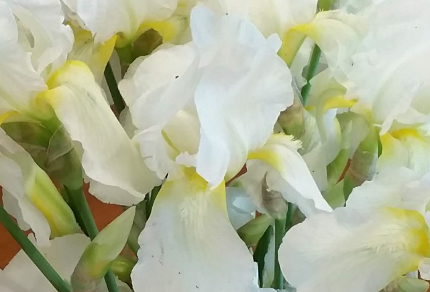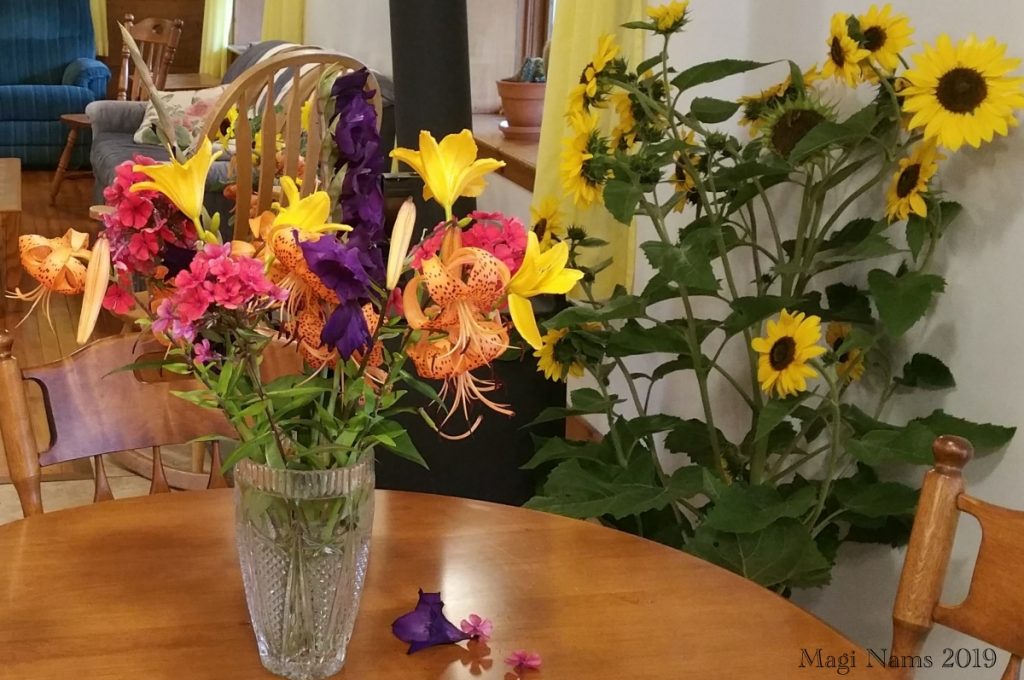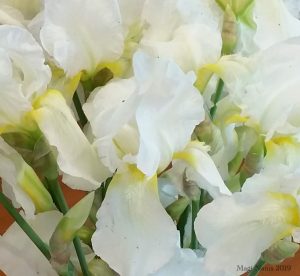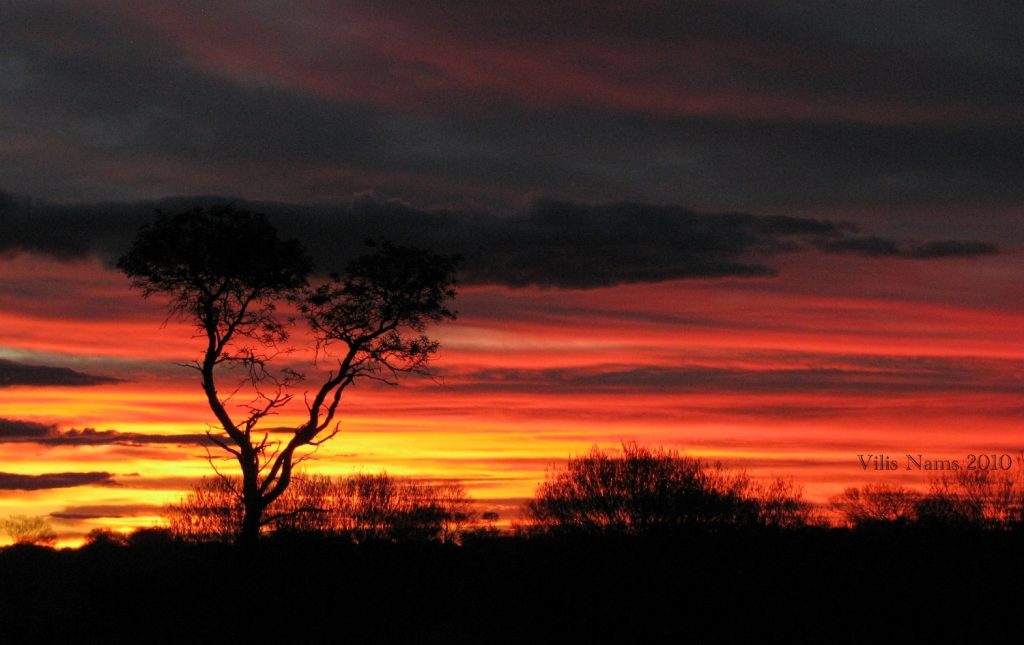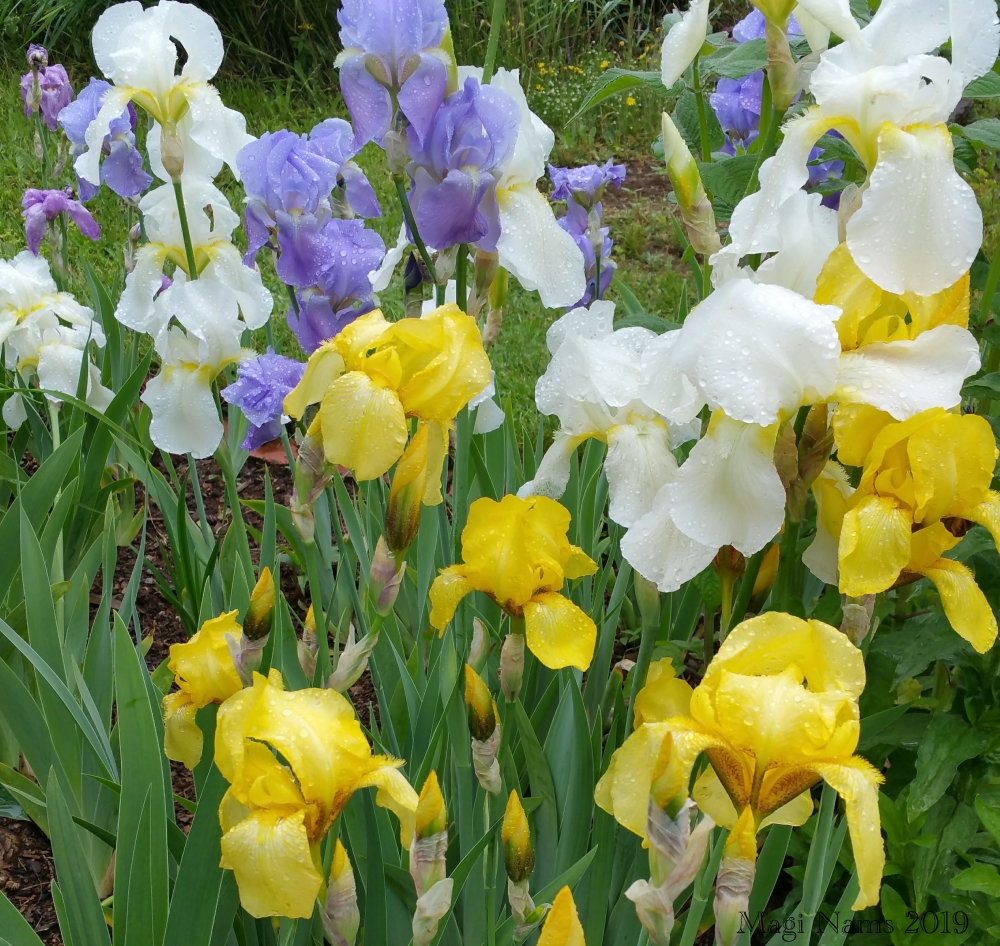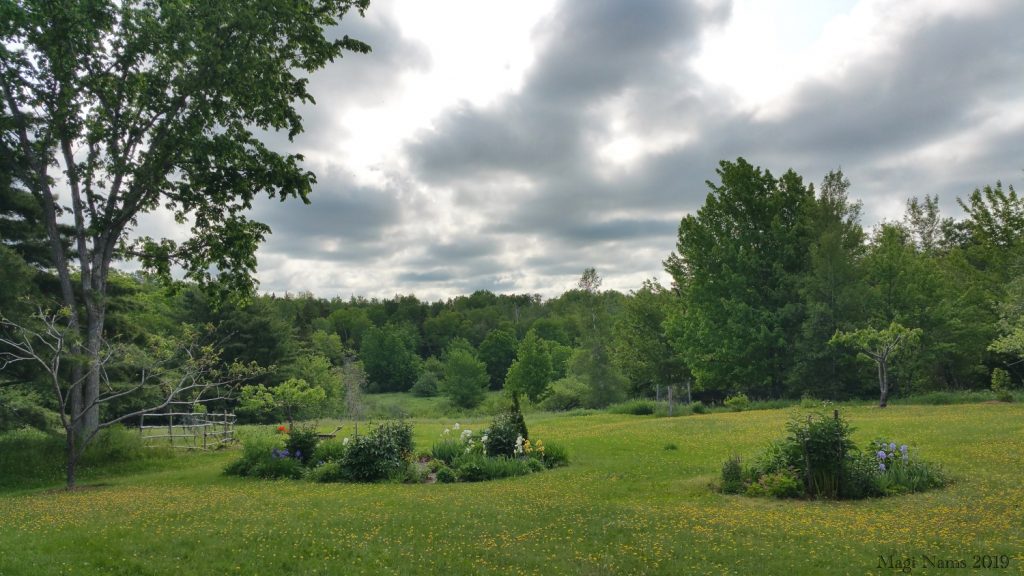How do we spread beauty in this world? We all have different talents, different gifts given to us by God. When we put these talents at God’s disposal, when we let Christ shine through us, we can make a difference.
My last Exploring Faith post (Who Am I To Receive a Gift of Such Beauty?) discussed how Jesus doesn’t discard people, no matter who they are or what they’ve done. Today’s post, inspired by torrential rain and sodden blossoms, shifts the focus to us and our role in spreading beauty in the world.
Here in Nova Scotia, the fresh days of late summer are upon us as we await the full impact of Category 1 Hurricane Dorian to arrive later today. A soft pink sunrise greeted me at 0600 this morning, the air calm and gentle—the classic lull before the storm. I did a last garden check and brought in a ripe cantaloupe and three vases filled with brilliant yellow sunflowers, orange tiger lilies, deep purple gladioli, buttery yellow daylilies, and hot pink phlox. A strengthening wind nudged my ripening peaches, causing me to wonder if there will be any fruit on the tree after the storm passes.
But let’s go back in time two-and-a-half months to another bout of wet, windy weather. One weekend in late June, downpours pelted my vegetable garden and early summer flowerbeds. I thought the carrot seeds I’d planted might be washed away, and my beloved white irises—so regal, with their tall stems—were bent beneath the onslaught of raindrops hitting and clinging to their huge blossoms. Some of the stalks were so heavy with rain, the flowers dragged on the ground. It hurt me to see them like that, so I filled a big vase and set it on my kitchen table.
All through supper, I could barely take my eyes off those irises—some speckled with bits of soil—but that wasn’t their fault. I told my husband, Vilis, “That something so luscious and exquisitely beautiful grows here—right here in my yard—is a mystery and a wonder to me. I planted a small piece and now our yard is filled with beauty.”
This scenario sparked the question: How do we spread beauty in this world?
Beauty is a catalyst
Beauty draws us to it, doesn’t it? Have you ever caught a glimpse of something so strikingly lovely that you hurried to get closer to it so you could drink in its essence? Have you ever watched a sunrise or sunset and felt glory flood your soul? Beauty fills us with hope in a way we often don’t understand. It tears our hearts open and pours in joy. It makes us dream of things we don’t even know. It’s a catalyst that sparks us into action or deep reflection, that makes us yearn, or that offers glimpses of things much bigger than ourselves.
Hearts need to be torn to ward off arrogance. Spirits need to yearn to awaken possibilities. Beauty can do this.
Is the Christian church a place of beauty?
It’s a sad thing that people who don’t know Jesus Christ in a personal way, or even who do know Jesus Christ in a personal way, might in some circumstances see the Christian church not as a place of beauty—a place that inspires them and awakens them to new and joyous possibilities—but rather as a place of ugly hypocrisy, of harsh condemnation, of painful back-biting, of greedy money-grabbing, or of ethnic or economic or sexual discrimination. In the light of history, the Christian church has much to apologize for. Think of the violence of the Crusades and the religious war in Northern Ireland. Think of the abuse in Canada’s residential schools.
And yet, this shouldn’t be. The life, death, and resurrection of Jesus Christ is the core of the Christian religion, and what could be more meaningful, more beautiful than God’s only son giving his life to save us from sin, to set us free to love God in a new and personal way—not through laws and sacrifices and fear, but in hope and joy, through faith and trust?
People yearn for beauty in their lives
There are a lot of hard things going on in the world, and it’s easy to become cynical in the midst of them, but people still yearn for beauty in their lives, they still yearn for hope, for acceptance, and for love. Pastor and author Brian Zahnd writes in Beauty Will Save the World:1
“To a skeptical world we are generally more accustomed to defend Christianity in terms of its truth and goodness. But beauty also belongs to the Christian faith. And beauty has a way of sneaking past defenses and speaking in unique ways. To a generation suspicious of truth claims and unconvinced by moral assertions, beauty has a surprising allure. And everything about Jesus Christ is beautiful. A Christianity that is deeply enchanted by Christ’s beauty and thus formed and fashioned by this beauty has the opportunity to present to a skeptical and jaded world an aspect of the gospel that has been too rare for far too long. Where truth and goodness fail to win an audience, beauty may once again captivate and draw those it enchants into the kingdom of saving grace.”1
Focusing on Christ’s beauty
I recognize that there is merit in using different approaches to bringing God’s word and the good news of the gospel to people. In fact, one of the things I like most about the small, non-denominational church I attend is the variety of perspectives presented in sermons, nearly all of which are given by lay speakers. Yet, it’s true that some preachers, past and present (not in my church, I hasten to say), have focused not on Christ’s beauty, but rather, on the fear factor—the eternal condemnation factor.
Perhaps the most famous sermon ever preached in the United States was spoken in 1741 by Jonathan Edwards. It was titled “Sinners in the Hands of an Angry God,” and it inspired generations of “angry God” preachers. One of them was Brian Zahnd, whom I quoted above. Zahnd zealously began his forty-year, present-day ministry as an “angry God” preacher. Then he experienced a spiritual transformation that caused him to abandon that view in favour of the understanding of God as a loving Father. In his book, Sinners in the Hands of a Loving God, Zahnd includes an excerpt from Jonathan Edward’s sensational sermon: (You might want to hold onto your seats for this.)
“The God that holds you over the pit of Hell, much as one holds a spider, or some loathsome insect, over the fire, abhors you, and is dreadfully provoked; his wrath towards you burns like fire; he looks upon you as worthy of nothing else, but to be cast into the fire; he is of purer eyes than to bear to have you in his sight; you are ten thousand times so abominable in his eyes as the most hateful venomous spider is in ours.”2
Wow! Now, some might argue that the end justifies the means, but if this paragraph had been my first introduction to Christianity, there’s a good chance I wouldn’t be a Christian today. It’s terrifying. There’s nothing welcoming or beautiful or inspiring about it. In my view, this passage totally conflicts with the pronouncement of God’s love for us, as stated in the gospel of John: “For God so loved the world that he gave his one and only Son, that whoever believes in him shall not perish but have eternal life. For God did not send his Son into the world to condemn the world, but to save the world through him.”3
Yes, we are sinners, but these bible verses don’t say anything about God abhorring us or seeing us as abominable. Instead, they speak of love and forgiveness. This is the beauty of Christ, and this is what we should desire to spread in the world.
How do we spread beauty in this world?
After his resurrection, Jesus told his disciples, “Therefore go and make disciples of all nations, baptizing them in the name of the Father and of the Son and of the Holy Spirit, and teaching them to obey everything I have commanded you. And surely I am with you always, to the very end of the age.”4 Earlier on in my Christian journey, I saw this “great commission” as a sort of authoritarian imposition. Go and make disciples of all nations. Do it. I didn’t read this verse as if it were saying,“Bring the beauty of Christ and his gift of salvation to all nations.” But that’s really what it’s saying, and this gift—this beauty—can be so alluring, so attractive to a seeking soul.
If we want to spread beauty in this world, all we need to do is let Christ shine through us. All we need to do is allow his light and loving warmth to touch others through what we do and say. Our words and actions don’t need to be big or showy. They do need to be honest and sincere, without any thought of repayment or expectation that a good deed will be returned.
Beauty of word or action is never wasted. It fills the souls of those who give it, and it fills the souls of those who are willing to receive it.
Christ’s beauty is a free gift
I never bought the first bit of white iris I planted. It was a gift. I have other irises in my yard, too. They bloom burgundy, cobalt, yellow, mauve, lavender, or plum-and-yellow. All of them were gifts—small or not-so-small plant pieces handed to me by other iris lovers. My mother-in-law. A babysitter (“If you don’t want them, they’re going in the compost.”). The white iris came to me from a nearly complete stranger, the generous mother of a new friend.
In the same way, I’ve passed on bits of my irises to others. This spring I potted up three for a church friend. It’s interesting that the two times I tried to grow irises I’d bought, they wilted and died, for some reason. The only irises that thrive in my yard are ones that were freely given to me.
How do we share glimpses of Christ’s love and forgiveness?
Just as iris lovers share irises, we can spread beauty in the world by offering to others small or not-so-small glimpses of Christ’s love and forgiveness—with all its mystery and wonder. A kind word. A smile. A sincere conversation. A heartfelt prayer. A helping hand. Perhaps, financial assistance. Perhaps, guarding someone’s dignity. Perhaps, simply taking time to listen.
In the gospel of Matthew, Jesus said, “Then the King will say to those on his right, ‘Come, you who are blessed by my Father; take your inheritance, the kingdom prepared for you since the creation of the world. For I was hungry and you gave me something to eat, I was thirsty and you gave me something to drink, I was a stranger and you invited me in, I needed clothes and you clothed me, I was sick and you looked after me, I was in prison and you came to visit me.’
“Then the righteous will answer him, ‘Lord, when did we see you hungry and feed you, or thirsty and give you something to drink? When did we see you a stranger and invite you in, or needing clothes and clothe you? When did we see you sick or in prison and go to visit you?’
“The king will reply, ‘Truly I tell you, whatever you did for one of the least of these brothers and sisters of mine, you did for me.”5
We all have different talents, different gifts given to us by God. When we put these talents at God’s disposal, when we stand ready to act in Christ’s name, we can make a difference. Mother Teresa said, “Every time you smile at someone, it is an action of love, a gift to that person, a beautiful thing.” She also said, “Kind words can be short and easy to speak, but their echoes are truly endless.”
Christ’s ambassadors
We are Christ’s ambassadors. Our words and actions tell a story even when we’re unaware of it. They’re a mirror that reflects our core values. Do our words and actions reflect Jesus? Do they mirror his selfless compassion and forgiveness? Do they enact what he commanded, “Love the Lord your God with all your heart and with all your soul and with all your mind,”6 and “Love your neighbor as yourself”7? Do they bring his beauty to others?
Beauty inspires hope
When I was tossing around ideas on this subject, I asked Vilis, “If you have no hope, can you feel joy?”
He answered, “No.”
Beauty inspires hope, and hope brings joy. As Christians, we have the beauty of Christ in our lives. We have the eternal hope he’s given us. We have the joy of knowing him as our saviour. How do we share beauty in this world? Let’s share the beauty, hope, and joy of Christ with others.
Beauty of word or action is never wasted. It fills the souls of those who give it, and it fills the souls of those who are willing to receive it.
References:
1. Brian Zahnd. Beauty Will Save the World. 2012. Charisma House, Lake Mary, FL, p. xv.
2. Brian Zahnd. Sinners in the Hands of a Loving God. 2017. Waterbrook, New York, p.3.
Scripture quotations taken from The Holy Bible, New International Version. NIV. Copyright 1973, 1978, 1984, 2011 by Biblica, Inc. Used by permission.
3. John 3:16-17
4. Matthew 28:19-20
5. Matthew 25:34-40
6. Matthew 22:37
7. Matthew 22:39

